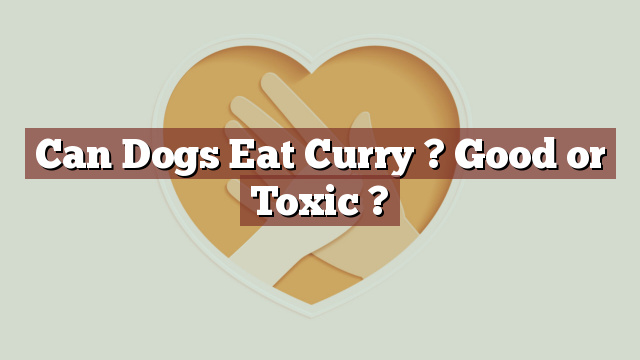Can Dogs Eat Curry? Good or Toxic?
Nutritional Value of Curry for Dogs: Essential Information
When it comes to feeding our furry companions, it is crucial to be aware of what foods are safe and healthy for them. One such food that often raises questions among dog owners is curry. Curry is a flavorful and aromatic blend of spices commonly used in Indian and Southeast Asian cuisine. But can dogs enjoy a taste of this exotic dish?
Can Dogs Eat Curry? Safety and Toxicity Explained
Unfortunately, dogs should not consume curry. While curry may be a favorite for many humans, it can pose serious health risks to our canine friends. The primary concern lies in the spices used to make curry, such as turmeric, cumin, and chili powder. These spices can be highly irritating to a dog’s digestive system and may even lead to gastrointestinal upset, including vomiting and diarrhea.
Moreover, some ingredients commonly found in curry recipes, such as onions and garlic, are known to be toxic to dogs. Both onions and garlic belong to the allium family and can cause damage to a dog’s red blood cells, leading to anemia. In severe cases, ingestion of these ingredients can be life-threatening for our four-legged companions.
It is essential to note that dogs have a different metabolic system than humans. What might be safe for us to consume can be harmful to them. Therefore, it is best to avoid feeding curry or any food containing curry spices to dogs.
Potential Risks and Benefits of Dogs Consuming Curry
The risks associated with dogs consuming curry far outweigh any potential benefits. While some believe that certain spices used in curry, such as turmeric, have anti-inflammatory properties, it is important to remember that dogs have different dietary needs than humans. Additionally, there are safer and more appropriate ways to incorporate beneficial spices into a dog’s diet, under the guidance of a veterinarian.
Feeding curry to dogs can lead to digestive issues and may even result in long-term health complications. It is not worth taking the risk when there are countless other safe and nutritious options available specifically formulated for canine consumption.
What to Do if Your Dog Eats Curry: Steps to Take
If your dog accidentally consumes curry or any dish containing curry spices, it is crucial to take immediate action. Monitor your dog’s condition closely for any signs of distress, such as vomiting, diarrhea, or abdominal pain. Make sure to keep your pet well-hydrated and offer small, bland meals to soothe their stomach.
If your dog shows severe symptoms or if you are uncertain about the ingredients they have ingested, do not hesitate to contact your veterinarian. They can provide guidance tailored to your dog’s specific situation and advise you on the best course of action.
Conclusion: Understanding the Impact of Curry on Dogs
In conclusion, it is important to recognize that dogs should not eat curry. The spices used in curry, along with ingredients like onions and garlic, can be potentially toxic and harmful to dogs. It is always better to err on the side of caution when it comes to feeding our beloved pets. By understanding the potential risks associated with curry consumption, we can ensure the well-being and health of our furry companions.
Thank you for investing your time in exploring [page_title] on Can-Eat.org. Our goal is to provide readers like you with thorough and reliable information about various dietary topics. Each article, including [page_title], stems from diligent research and a passion for understanding the nuances of our food choices. We believe that knowledge is a vital step towards making informed and healthy decisions. However, while "[page_title]" sheds light on its specific topic, it's crucial to remember that everyone's body reacts differently to foods and dietary changes. What might be beneficial for one person could have different effects on another. Before you consider integrating suggestions or insights from "[page_title]" into your diet, it's always wise to consult with a nutritionist or healthcare professional. Their specialized knowledge ensures that you're making choices best suited to your individual health needs. As you navigate [page_title], be mindful of potential allergies, intolerances, or unique dietary requirements you may have. No singular article can capture the vast diversity of human health, and individualized guidance is invaluable. The content provided in [page_title] serves as a general guide. It is not, by any means, a substitute for personalized medical or nutritional advice. Your health should always be the top priority, and professional guidance is the best path forward. In your journey towards a balanced and nutritious lifestyle, we hope that [page_title] serves as a helpful stepping stone. Remember, informed decisions lead to healthier outcomes. Thank you for trusting Can-Eat.org. Continue exploring, learning, and prioritizing your health. Cheers to a well-informed and healthier future!

